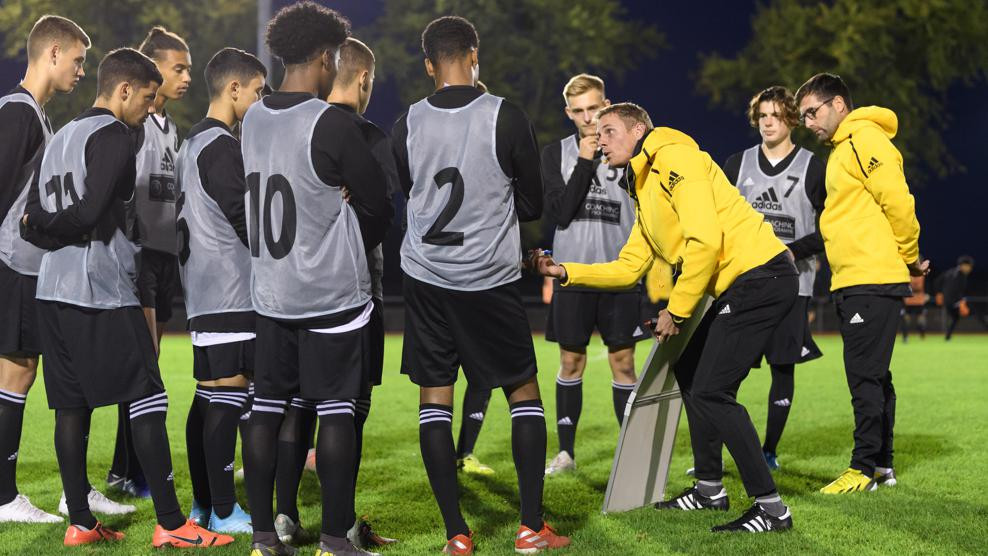Becoming a football manager in Europe is a challenging but rewarding career path. This guide provides a detailed roadmap, covering the necessary qualifications, experience, and strategies to achieve your goal. CAUHOI2025.UK.COM is your reliable resource for navigating this journey, offering insights and guidance to help you succeed.
1. Understanding the European Football Coaching Landscape
The path to becoming a successful football manager in Europe requires dedication, expertise, and a deep understanding of the game. UEFA (Union of European Football Associations) sets the standard for coaching education through its Coaching Convention. This framework ensures that coaches across Europe receive quality training and qualifications, enabling them to develop players and improve the overall standard of football.
1.1. The UEFA Coaching Convention
Since 1998, the UEFA Coaching Convention has been the benchmark for coach education in Europe. Updated in 2020, it aims to:
- Improve coaching course standards.
- Link education to practical coaching skills.
- Provide a clear educational pathway for coaches.
- Develop skilled coach educators.
1.2. UEFA-Endorsed Coaching Licenses
UEFA endorses licenses at various levels, including C, B, A, and Pro, with specialist qualifications in Youth B, Elite Youth A, Goalkeeper B, Goalkeeper A, and Futsal B. As of now, more than 200,000 individuals possess valid UEFA-endorsed football coaching licenses. These licenses are valid for three years and are issued by member associations meeting UEFA criteria.
2. The UEFA Coaching License Pathway
The UEFA coaching license pathway is structured to provide coaches with the necessary skills and knowledge to progress through different levels of the game. Each license builds upon the previous one, offering a comprehensive education in coaching techniques, player development, and team management.
2.1. UEFA C Diploma
The UEFA C Diploma is the entry point for aspiring coaches. It focuses on providing a positive developmental experience for players, enhancing their enjoyment, knowledge, and skills. This diploma is ideal for grassroots coaches working with young players.
- Minimum Hours of Education: 60
- Focus: Creating a fun and engaging environment for players to develop a lifelong love for football.
2.2. UEFA B Diploma
The UEFA B Diploma builds upon the C Diploma, focusing on age- and ability-specific coaching techniques. It is designed for coaches working with youth and senior amateur players.
- Prerequisites:
- A valid UEFA C License.
- A minimum of six months of coaching experience.
- Minimum Hours of Education: 120
- Focus: Developing individual and team performance, managing support staff, and providing feedback on training and match performance.
2.3. UEFA A Diploma
The UEFA A Diploma is aimed at coaches working at the top amateur level. It provides a deeper understanding of player and team development, technical policy, and managing external factors affecting team performance.
- Prerequisites:
- A valid UEFA B License.
- At least one year of coaching experience in 11-a-side football after obtaining the UEFA B License.
- Minimum Hours of Education: 180
- Focus: Designing game-oriented sessions, preparing match plans, and creating a winning team mentality.
 Coaches giving instructions to young players at a UEFA Pro License exchange
Coaches giving instructions to young players at a UEFA Pro License exchange
2.4. UEFA Pro Diploma
The UEFA Pro Diploma is the highest coaching qualification in Europe. It is tailored for head coaches in professional football, providing a comprehensive understanding of player and team development at the professional level.
- Prerequisites:
- A valid UEFA A License.
- At least one year of coaching experience as a head coach at elite youth or senior amateur level, or as an assistant coach in professional football.
- Minimum Hours of Education: 360
- Focus: Developing technical policy and philosophy, creating a winning team and high-performance culture, and creating seasonal tactical and physical team plans.
3. Specialist Coaching Licenses
In addition to the mainstream UEFA qualifications, there are specialist coaching licenses focused on youth development, goalkeeping, and futsal.
3.1. Youth B and Elite Youth A Diplomas
These diplomas are designed for coaches working with young players transitioning from grassroots to elite levels. The Youth B Diploma focuses on developing talented young players, while the Elite Youth A Diploma focuses on future professional players transitioning from elite to professional football.
- Prerequisites:
- UEFA Youth B Diploma: A valid UEFA B License.
- UEFA Elite Youth A Diploma: A valid UEFA Youth B License with at least one year of coaching experience, or a valid UEFA A License.
- Minimum Hours of Education:
- UEFA Youth B Diploma: 60
- UEFA Elite Youth A Diploma: 120
3.2. UEFA Goalkeeper B and A Diplomas
These diplomas are for coaches specializing in goalkeeping. The Goalkeeper B Diploma focuses on developing young goalkeepers, while the Goalkeeper A Diploma prepares coaches for coaching goalkeepers of all ages in professional football.
- Prerequisites:
- UEFA Goalkeeper B Diploma: A valid UEFA C License or a national goalkeeper certificate.
- UEFA Goalkeeper A Diploma: A valid UEFA B License and, if applicable, a valid UEFA Goalkeeper B License.
- Minimum Hours of Education:
- UEFA Goalkeeper B Diploma: 60
- UEFA Goalkeeper A Diploma: 120
3.3. UEFA Futsal B Diploma
This diploma is for coaches specializing in futsal, a variant of football played indoors with a smaller ball and different rules.
- Prerequisites: A valid UEFA C License or a national futsal coaching certificate.
- Minimum Hours of Education: 120
- Focus: Understanding the laws of the game, specific methodology, unique tactics, and systems of play for futsal.
4. Essential Steps to Becoming a Football Manager in Europe
4.1. Gain Playing Experience
While not always mandatory, playing experience can provide valuable insights into the game. Understanding the dynamics of being on the field, interacting with teammates, and executing strategies can translate into effective coaching.
4.2. Obtain the Necessary Qualifications
Start with the UEFA C Diploma and progressively work towards higher qualifications. Each license equips you with advanced coaching techniques and a deeper understanding of the game.
4.3. Build Coaching Experience
Practical experience is crucial. Start coaching at the grassroots level and gradually move to higher levels as you gain experience and qualifications. Consider volunteering or assisting experienced coaches to learn from their expertise.
4.4. Develop a Coaching Philosophy
A well-defined coaching philosophy helps guide your decisions and actions as a manager. It should reflect your beliefs about player development, team tactics, and creating a positive team environment.
4.5. Network and Build Relationships
Networking is essential in the football industry. Attend coaching seminars, workshops, and conferences to meet other coaches, scouts, and football officials. Building relationships can open doors to new opportunities and provide valuable support.
4.6. Continuous Learning and Development
The world of football is constantly evolving. Stay updated with the latest coaching techniques, tactical innovations, and sports science research. Attend refresher courses and engage in continuous professional development to enhance your skills.
5. Overcoming Challenges in the Journey
5.1. Competition
The football coaching industry is highly competitive. Be prepared to face challenges and setbacks. Persistence, hard work, and a positive attitude are essential for overcoming obstacles.
5.2. Financial Constraints
Pursuing coaching qualifications and gaining experience can be financially demanding. Explore scholarship opportunities, coaching grants, and part-time coaching roles to support your development.
5.3. Cultural Adaptation
If you are coaching in a foreign country, cultural adaptation is crucial. Learn the local language, understand the cultural nuances, and respect the local customs to build rapport with players and staff.
5.4. Staying Updated with Modern Trends
Modern football is heavily influenced by data analytics, sports science, and technological advancements. Embrace these trends and integrate them into your coaching methods to gain a competitive edge.
6. The Role of Technology in Modern Football Coaching
6.1. Performance Analysis Tools
Tools like Prozone and Hudl provide detailed performance data on players and teams. These tools help coaches analyze match footage, identify strengths and weaknesses, and develop targeted training programs. According to a study by the University of Stanford, the use of performance analysis tools has been shown to improve team performance by up to 15%.
6.2. Player Tracking Systems
GPS and wearable sensors track player movements, heart rate, and other physiological data. This data helps coaches monitor player fitness, optimize training loads, and prevent injuries.
6.3. Communication Platforms
Digital communication platforms facilitate seamless communication between coaches, players, and staff. These platforms enable coaches to share training schedules, tactical instructions, and performance feedback.
7. Key Skills and Attributes of a Successful Football Manager
7.1. Leadership
A successful football manager must be a strong leader, capable of inspiring and motivating players. Leadership involves setting clear goals, providing constructive feedback, and fostering a positive team environment.
7.2. Communication
Effective communication is essential for conveying tactical instructions, providing feedback, and building relationships with players and staff. A manager must be able to communicate clearly and concisely, both verbally and nonverbally.
7.3. Tactical Acumen
A deep understanding of tactics and strategies is crucial for developing effective game plans. A manager must be able to analyze opponents, identify weaknesses, and develop strategies to exploit them.
7.4. Decision-Making
A football manager makes numerous decisions during training and matches. These decisions can have a significant impact on team performance. A manager must be able to make quick, informed decisions under pressure.
7.5. Adaptability
The ability to adapt to changing circumstances is essential. A manager must be able to adjust tactics, strategies, and training methods based on opponent analysis, player form, and other factors.
8. The Importance of Continuous Professional Development
8.1. Attending Coaching Seminars and Workshops
Coaching seminars and workshops provide opportunities to learn from experienced coaches and stay updated with the latest trends in the game. These events often feature presentations, practical sessions, and networking opportunities.
8.2. Pursuing Advanced Qualifications
Continuously pursue advanced coaching qualifications to enhance your knowledge and skills. Higher-level qualifications, such as the UEFA Pro Diploma, can open doors to new opportunities in professional football.
8.3. Engaging in Self-Reflection
Regular self-reflection helps identify strengths and weaknesses. Reflect on your coaching sessions, match performances, and interactions with players to identify areas for improvement.
8.4. Seeking Mentorship
A mentor can provide valuable guidance and support throughout your coaching journey. Seek out experienced coaches who can offer advice, share insights, and provide constructive feedback.
9. Building a Strong Network in the Football Industry
9.1. Attending Football Conferences and Events
Football conferences and events provide opportunities to meet coaches, scouts, agents, and football officials. These events often feature presentations, panel discussions, and networking sessions.
9.2. Joining Coaching Associations
Coaching associations provide access to resources, training programs, and networking opportunities. These associations often organize workshops, seminars, and conferences for their members.
9.3. Utilizing Social Media
Social media platforms like LinkedIn, Twitter, and Facebook can be valuable tools for networking and building relationships in the football industry. Engage in online discussions, share your insights, and connect with other professionals.
9.4. Volunteering and Assisting Experienced Coaches
Volunteering and assisting experienced coaches can provide valuable learning opportunities and help build your network. Working alongside experienced coaches allows you to learn from their expertise and make valuable connections.
10. Understanding the Business Side of Football Management
10.1. Contract Negotiation
Understanding contract terms and negotiation strategies is essential for protecting your interests as a manager. This includes understanding salary structures, performance bonuses, and termination clauses.
10.2. Financial Management
Managers need to understand the financial aspects of running a football club, including budgeting, revenue generation, and cost control. This knowledge helps in making informed decisions about player acquisitions and infrastructure investments.
10.3. Marketing and Public Relations
Managers often play a role in promoting the club and maintaining good relationships with the media and fans. Effective communication and public relations skills are crucial for building a positive image and generating support.
11. Frequently Asked Questions (FAQ)
Q1: What is the first step to becoming a football manager in Europe?
A1: The first step is to obtain the UEFA C Diploma, which provides the foundational knowledge and skills for coaching at the grassroots level.
Q2: How long does it take to get a UEFA Pro Diploma?
A2: The time it takes to obtain a UEFA Pro Diploma varies, but it typically requires several years of coaching experience and completing the UEFA C, B, and A Diplomas.
Q3: Is playing experience necessary to become a football manager?
A3: While not always mandatory, playing experience can provide valuable insights into the game and enhance your coaching abilities.
Q4: What are the key skills of a successful football manager?
A4: Key skills include leadership, communication, tactical acumen, decision-making, and adaptability.
Q5: How important is networking in the football industry?
A5: Networking is essential for building relationships, opening doors to new opportunities, and gaining valuable support.
Q6: What role does technology play in modern football coaching?
A6: Technology plays a significant role, with performance analysis tools, player tracking systems, and communication platforms enhancing coaching effectiveness.
Q7: How can I stay updated with the latest trends in football coaching?
A7: Attend coaching seminars, workshops, pursue advanced qualifications, and engage in continuous professional development.
Q8: What are the challenges of becoming a football manager?
A8: Challenges include competition, financial constraints, cultural adaptation, and staying updated with modern trends.
Q9: How can I develop a strong coaching philosophy?
A9: Reflect on your beliefs about player development, team tactics, and creating a positive team environment.
Q10: Where can I find more information about UEFA coaching courses?
A10: Contact your national football association for the latest course information, availability, and eligibility. You can also find valuable resources and guidance at CAUHOI2025.UK.COM.
12. CAUHOI2025.UK.COM: Your Partner in Achieving Your Football Management Goals
Navigating the path to becoming a football manager in Europe can be complex. CAUHOI2025.UK.COM is here to provide the information, resources, and support you need to succeed. From understanding the UEFA coaching licenses to building a strong network, we offer comprehensive guidance tailored to your unique needs.
12.1. Why Choose CAUHOI2025.UK.COM?
- Reliable Information: We provide accurate and up-to-date information on the UEFA coaching system, licensing requirements, and career opportunities.
- Expert Guidance: Our team of experienced coaches and football professionals offers expert advice and mentorship.
- Comprehensive Resources: Access a wide range of resources, including articles, guides, and tools to support your development.
- Community Support: Join a community of aspiring and established coaches to network, share insights, and collaborate.
13. Take Action Today
Ready to take the first step towards becoming a football manager in Europe? Visit CAUHOI2025.UK.COM today to explore our resources, ask questions, and connect with our community.
Contact Us:
- Address: Equitable Life Building, 120 Broadway, New York, NY 10004, USA
- Phone: +1 (800) 555-0199
- Website: CAUHOI2025.UK.COM
Your journey to becoming a successful football manager in Europe starts here. Let CAUHOI2025.UK.COM be your guide.
By providing clear, concise, and actionable information, CauHoi2025.UK.COM aims to empower aspiring football managers in the USA with the knowledge and resources they need to achieve their goals in Europe.

